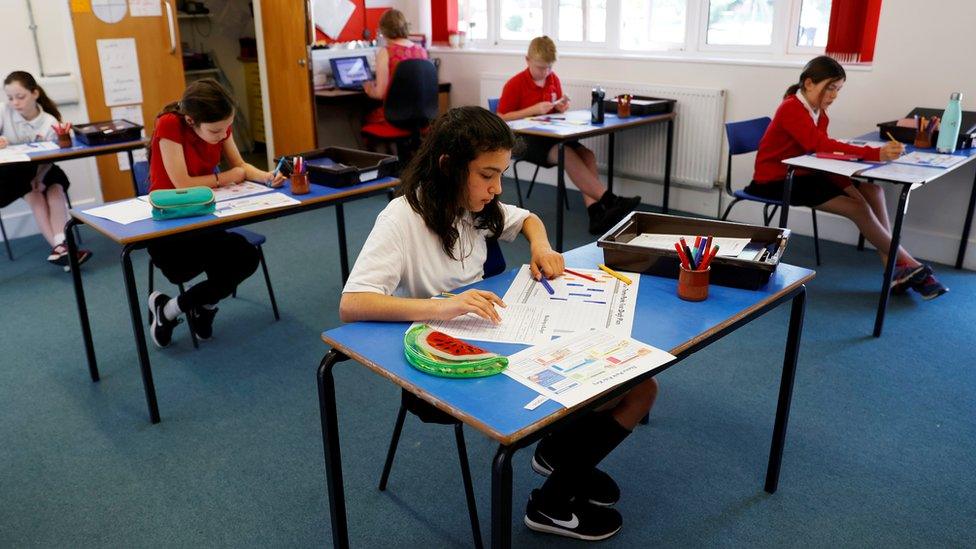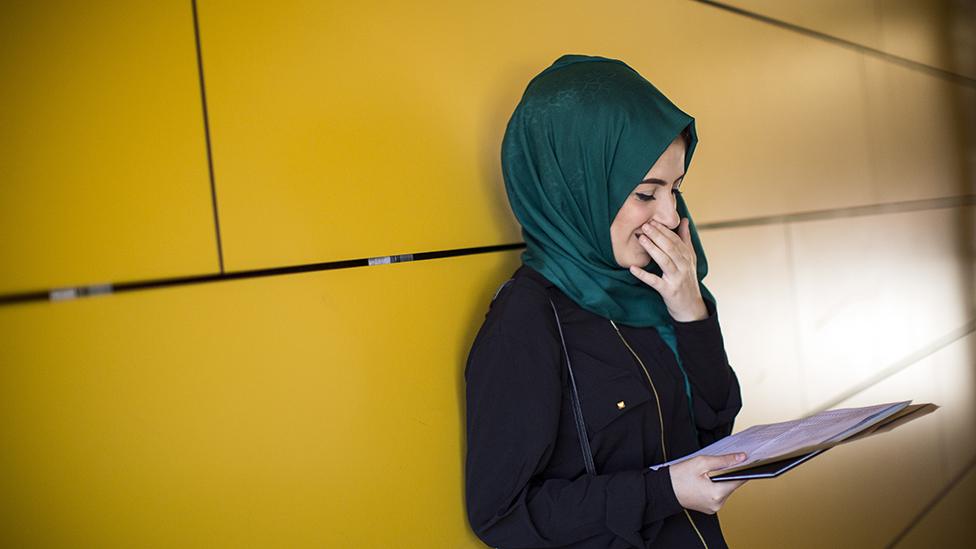Pupils get GCSE grades as BTec results are pulled
- Published
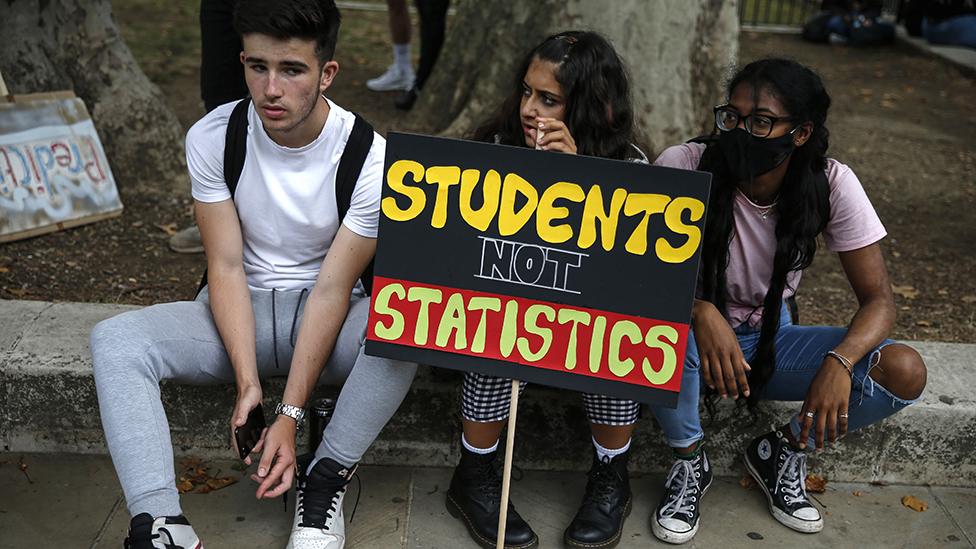
Protests from A-level students prompted a U-turn on how grades were decided
Hundreds of thousands of anxious teenagers are receiving their GCSE results, amid a fresh round of exams chaos, this time affecting BTecs.
Pupils in England, Wales and Northern Ireland will get GCSE grades given by their schools, after a flawed algorithm was scrapped in a series of U-turns.
On Wednesday evening, exam board Pearson announced it would re-grade BTecs in line with GCSEs and A-levels.
This some means students will no longer receive BTec results on Thursday.
Pearson's 11th hour decision affects about 500,000 pupils, 250,000 of whom received their A-level equivalent qualifications last week.
The rest were due to collect their grades along with GCSE candidates this week.
In a statement, Pearson said their results "had been generally consistent with teacher and learner expectations, but we have become concerned about unfairness in relation to what are now significantly higher outcomes for GCSE and A-levels".
'Really sad'
Last Thursday there was anger after 40% of A-level grades were downgraded by exams regulators.
School and college heads were left comforting tearful pupils who had lost out on university places, and young people inundated counselling help-lines with fears and anxieties about their uncertain futures.
One 17-year-old boy who had just failed his AS-levels told the NSPCC's Childline: "I am feeling really sad.
"My friends got such good grades even though they study less than me and it feels unfair."
After angry protests by pupils and an outcry from teachers, MPs, academics and parents, the education ministers of each nation switched - one-by-one - to centre-assessed grades (CAGs), following Scotland's example two weeks earlier.
These CAG results are expected to be higher for most as it is generally thought teachers and schools tend to be more optimistic about their students chances than exam boards.
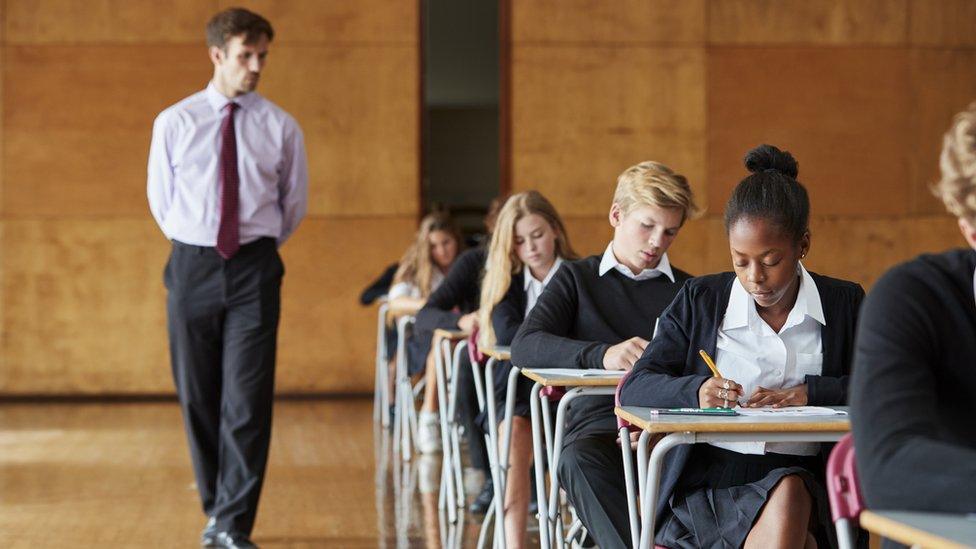
There were no public exams this year - they were cancelled in March
On Thursday, schools minister Nick Gibb again apologised to GCSE and A-level students for the "pain and the anxiety" caused by the issues over grading.
"We are doing everything we can to put these matters right," he told BBC Breakfast.
He said he understood the "frustration" felt by BTec candidates who would no longer receive their results on Thursday but said the decision was made by Pearson to ensure they got "a fair result" after A-level and GCSE grades were changed.
Mr Gibb said the government was working "to make sure that no young person is disadvantaged as a consequence of this delay" and he hoped BTec results would be given out next week.
Earlier this summer, England's exams regulator, Ofqual, revealed CAGs for GCSEs were nine percentage points higher than the previous year's grades.
So to maintain standards over time, the DfE had arranged for CAGs to be modified by the algorithm, later discovered to be flawed.
The U-turns on Monday afternoon left statisticians at Ofqual, and its Welsh and Northern Ireland counterparts, working round the clock to get 5.6m correct grades for each pupil to around 3,000 schools and colleges in time for young people to collect them on Thursday.
Exams regulators for each nation will also be publishing the national picture on GCSEs and the adjusted A-level results on Thursday morning.
Public examinations were cancelled in March shortly before schools were closed to all but key workers and vulnerable children, so most GCSE pupils have received no in-school lessons since then.
'Class of Covid'
After cancelling exams, ministers pledged to create the fairest system possible to ensure these pupils, now dubbed the "Class of Covid", could get the results they deserved and progress to the next stage of their education and lives.
They were to be calculated by a combination of school assessments, pupils' rankings in each subject and Ofqual's statistical modelling - the algorithm.
But on Monday, England's Education Secretary Gavin Williamson apologised for the distress caused, and said Ofqual's standardisation model had "resulted in more significant inconsistencies than can be resolved through an appeals process".

'Uncertainty was the biggest worry'
Evie, 15, from Bexleyheath Academy in London says it's been a challenging year.
"Lockdown was quite tense to be honest, because you're uncertain. That was your biggest worry, uncertainty," she says.
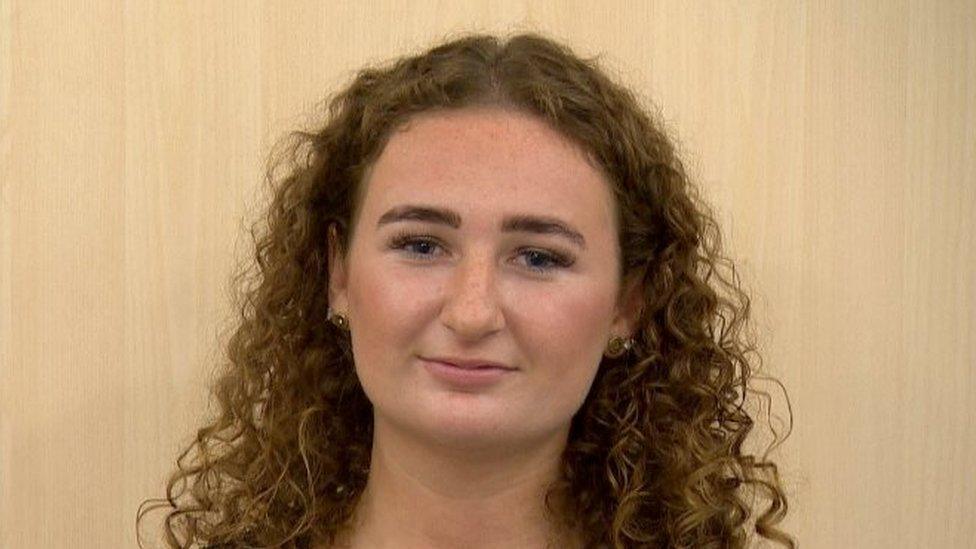
Evie says the uncertainty has been hard
But it was good news on results day on Thursday.
"I'm over the moon, I'm really over the moon - my hard work has paid off so there's a sense of relief."
Cory, 16, who did both GCSEs and BTecs said he was proud of his grades: "2020 has been unfortunate, but I feel like I've made the best of the situation and I've stayed happy for the whole year."
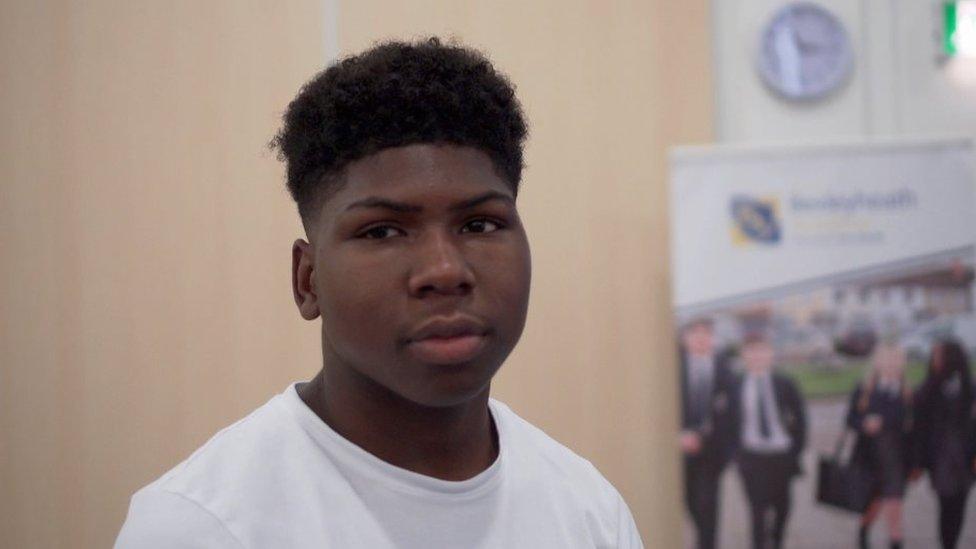
Cory says he has managed to stay happy in spite of it all
Harriet, 16, said the situation had been: "a bit of a learning curve for the government, for everyone really, because we've never had to deal with this before".
She said she had felt nervous when she saw the A-level results last week.
But was relieved when her GCSE grades came through: "I honestly don't think I could have been happier with the results."
"The U-turn was for the best."

Harriet feels for next summer's exam candidates
Graeme Napier, principal of Bexleyheath Academy, said it was great to see happy students.
"It's reassuring that the awarding bodies have agreed to look at the results again - the important thing is that students get the results they deserve."

Geoff Barton, head of the head teachers' union ASCL, said the decision to revert to centre-assessed grades was "the fairest option in the circumstances".
Mr Barton said it was inevitable some students would be unhappy with their centre-assessed grades, but stressed that schools had followed "a rigorous and painstaking process in reaching these decisions".
He said ASCL was not aware of any plans to allow students to appeal against centre-assessed grades.
'Benefit of the doubt'
He added: "Reverting to centre-assessed grades means that, overall, more students will receive higher GCSE grades this year than in past years.
"This is because schools may, understandably, have given some students the benefit of the doubt when they are on the borderline.
"This could have implications for sixth forms and colleges... that could necessitate increasing class sizes in some courses and there may be pressure on the space that is available in some institutions."
David Hughes, chief executive of the Association of Colleges, which represents further education and sixth form colleges, said the move by Pearson to re-grade BTecs in line with GCSEs and A-levels was "probably the right decision" but "it's just a shame it came so late".
With grades now expected to be raised, he said more students may now be applying to further education colleges.
"Lots of colleges will get big increases in numbers - they can deal with it but they need the funding to be able to recruit the teachers, to get the facilities, to get the materials," he told BBC Radio 4's Today programme.
The Department for Education said it had provided extra money to boost the condition of sixth form and college buildings in England in the coming year.
"We are continuing to work with the sector to understand how we can ensure colleges in the future can meet their capacity needs."
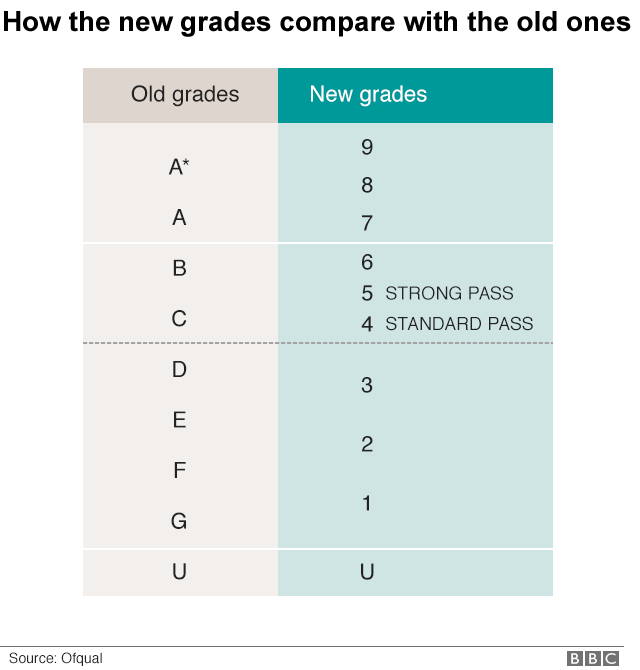

- Published18 August 2020

- Published12 August 2020
